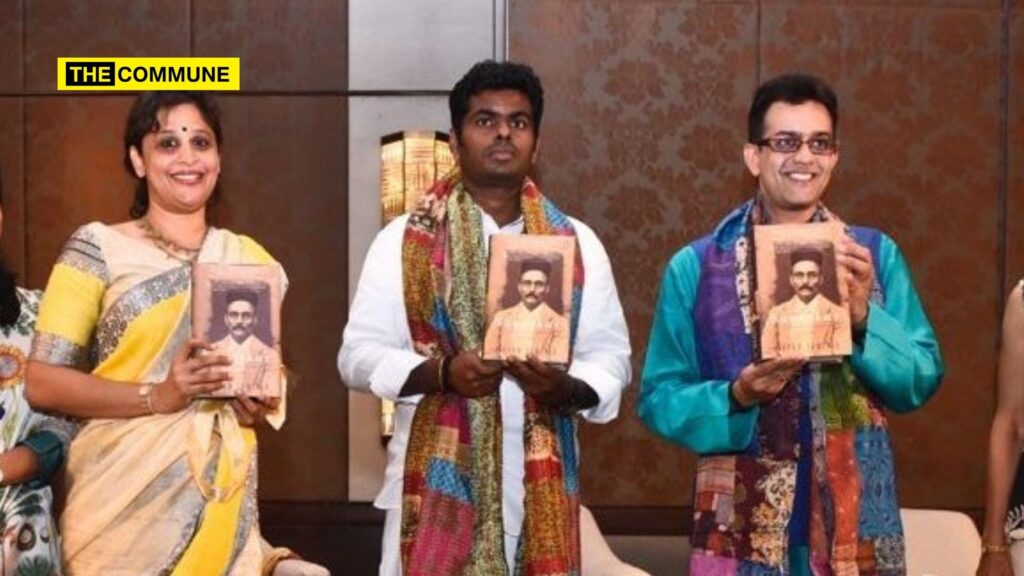At a panel discussion organized by Prabha Khaitan Foundation, Dr. Vikram Sampath, the author of the 2-part magnum opus book on Veer Savarkar said that the man who remains relevant to this day given the ascension of Hindutva political philosophy, remains a persona non-grata in Indian history.
He said that the everyone had every right to admire or hate a person, provided it was informed opinion, rather than calumny or pre-conceived notions against the individual.
Vikram explained in detail how the man who had worked for the reformation of the Hindu society by breaking the barriers of casteism has been demonized and derogated due to the political machinations against him.
He noted Savarkar had been a pioneer in breaking casteism by organizing sacred thread wearing ceremony, inter-caste dining events like Sahabhojan, setting up of temple in Ratnagiri where Dalits were the priests, etc.
He noted that by advocating meritocracy over hereditary authority, he hit at the roots of the ill-effects of casteism.
“He strove to eradicate untouchability, but became a political untouchable; was a persona non grata in Indian history and everyone associated with him paid a heavy price. But, his political relevance is intense in contemporary India and his ideology of Hindutva is on the ascendant” the Vikram said.
Vikram also mentioned that several bookstores had not stocked the first part of the book when it was released and how he faced boycott from the ‘gatekeepers of history’.
Pointing to the dismissal of Hridaynath Mangeshkar (younger brother of renowned singer Lata Mangeshkar) from All India Radio for creating a musical composition based on Veer Savarkar’s poem, Sampath noted how the Congress governments and their leaders ostracised Veer Savarkar and penalised those who did not conform to their vilification.
Vikram Sampath mentioned how Savarkar was maliciously framed in the Gandhi Assassination based on the confession statement of a petty criminal to the police. Quoting Ambedkar’s lawyer on the trial of Savarkar in the Gandhi Assassination, the author said “it’s a fixed match and the highest power ordered to fix him”(a blatant reference to India’s First Prime Minister Jawaharlal Nehru). However, it was also added that leaders after Nehru, including Indira Gandhi had publicly praised Savarkar.
Vikram Sampath also noted the contributions of VVS Iyer, who was the right-hand man for Savarkar during his London days. He pointed out that Savarkar’s biography which is popularly believed to be written by himself under a pseudonym Chitragupta could have been written by VVS Iyer or C. Rajagopalachari.
Speaking on the occasion, BJP Tamil Nadu President K. Annamalai recalled his visit to the Cellular Jail in Andaman during his Bharat Darshan tour as a young IPS officer. He said that he had the opportunity to visit the cell of Savarkar and which made him realize what solitary confinement and forcing a person away from his loved ones would do.
He said that Savarkar was a man who was way ahead of his times by striving for real social justice through his work while pointing to the pseudo-social justice as propagated by the DMK.
Annamalai said Savarkar has been demonized unfairly noting that even Gandhi and Dr. Ambedkar had supported the cause of Savarkar’s release and pardon.
He also read out a page from the book, that carried the vision that Savarkar had for Independent India (India of Savarkar’s dreams). It referred to a democratic state that was home to different religions, where people of all sects and races lived in equality and there was no domination or deprivation of rights, and people had to discharge their common obligation to the state and how “Hindustan’ would extend from Indus to the seas. It also makes a mention of a country that was self-reliant in food, clothes, shelter, and defence, it emphasized on a foreign policy of neutrality and peaceful and powerful centralized state of Hindustan.
On a final note, Dr. Sampath said that history was a means of recounting horrors of the past and healing the wounds and ensuring that these crimes are committed again. He said that, had the then powers punished the perpetrators of the riots in 1948(against Maharashtrian Brahmins), the 1984 riots (against Sikhs) would not have happened. He connects the unfortunate and gruesome pogrom of Marathi Brahmins after the Gandhi Assassination to the Sikh program after the Indira Gandhi Assassination, both the massacres which were perpetrated by the Congress party and its functionaries.
Vikram Sampath disclosed that his next books will be on Chatrapati Shivaji Maharaj and Tipu Sultan.
Click here to subscribe to The Commune on Telegram and get the best stories of the day delivered to you personally.

